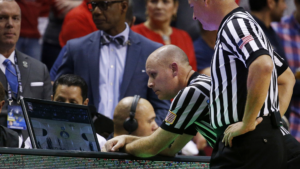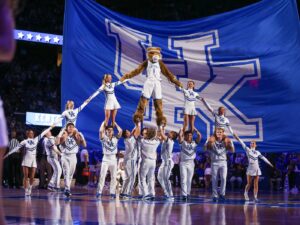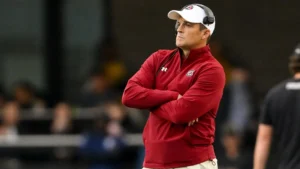
The Kentucky Wildcats have long been synonymous with basketball excellence, producing countless legends over the years. Among those who stand out as pivotal figures in the university’s rich basketball history is Dan Issel. Known for his incredible talent, fierce competitiveness, and deep ties to the Kentucky program, Issel’s legacy has not only impacted the Wildcats but also shaped the broader landscape of basketball at the collegiate and professional levels. The decision to erect a statue of Dan Issel at Rupp Arena is a fitting tribute to a player whose influence is still felt today.
In this reflection on his remarkable career and the significance of this honor, we will explore Issel’s impact both on and off the court. From his time as a player for the University of Kentucky to his professional career in the ABA and NBA, as well as his enduring influence in the community, Issel’s legacy is one defined by excellence, leadership, and an unwavering love for the game of basketball.
Early Life and Journey to Kentucky
Dan Issel was born on October 25, 1948, in Batavia, Illinois. From a young age, he showed great promise in basketball, using his height (6’9”) and innate skill to dominate at various levels of competition. As a high school player, Issel already exhibited the traits that would later make him a standout at the collegiate level—basketball IQ, a relentless work ethic, and the ability to lead his team.
Issel’s potential caught the eye of the University of Kentucky, one of the most prestigious college basketball programs in the nation. Under the guidance of legendary head coach Adolph Rupp, Kentucky was a perennial powerhouse, and Issel’s recruitment was seen as a crucial step in the continued success of the Wildcats. He committed to play for Kentucky in 1967, and that decision would shape the trajectory of his career and solidify his place in the program’s history.
College Career at Kentucky
Dan Issel’s time at Kentucky is nothing short of legendary. Playing for the Wildcats from 1967 to 1970, Issel made an immediate impact as a freshman, showcasing his scoring ability, rebounding prowess, and leadership skills. Over the course of his college career, Issel became one of the most dominant players in college basketball, helping to lead Kentucky to numerous victories and championships.
During his time with the Wildcats, Issel averaged 25.7 points per game and 12.6 rebounds per game. He was a force on both ends of the floor, capable of scoring in a variety of ways—whether it was finishing at the rim, hitting mid-range jump shots, or drawing fouls and converting at the free-throw line. His scoring ability was complemented by his rebounding, where he used his size and strength to dominate the glass.
One of the highlights of Issel’s college career was leading Kentucky to the 1969 NCAA Tournament, where he guided the Wildcats to a Final Four appearance. Although Kentucky ultimately fell short of winning the national title, Issel’s performance throughout the tournament cemented his reputation as one of the premier players in the country. His ability to perform under pressure was a testament to his character and made him a fan favorite among Kentucky supporters.
Issel’s individual accomplishments during his time at Kentucky were remarkable. He was a three-time All-American and was named to the SEC (Southeastern Conference) First Team in each of his three seasons. In 1970, Issel also received the prestigious SEC Player of the Year award. By the time he left Kentucky, Issel had scored more than 2,000 points, a record at the time, and had firmly established himself as one of the greatest players to ever don a Wildcats uniform.
Professional Career: ABA and NBA
Following his successful collegiate career, Issel transitioned to the professional ranks, where he continued to make a significant impact. He was selected by the Detroit Pistons in the second round of the 1970 NBA Draft, but his professional journey would take him in a different direction. Issel joined the American Basketball Association (ABA), where he would play the majority of his professional career.
Issel’s time in the ABA was marked by individual success and team achievements. He played for the Oakland Oaks, the Indiana Pacers, and the Denver Nuggets during the 1970s. In the ABA, Issel established himself as one of the league’s premier players. He was known for his scoring, rebounding, and toughness—traits that would define his career both in the ABA and in the NBA. Over his six seasons in the ABA, Issel was a multiple-time All-Star and earned numerous accolades for his consistent performance.
In 1976, with the ABA-NBA merger on the horizon, Issel moved to the NBA, where he continued to excel. He joined the Denver Nuggets, where he would play for most of his career. Issel’s leadership on the court was a significant factor in the Nuggets’ success during the 1970s and 1980s. He helped lead the team to multiple playoff appearances and was consistently one of the team’s top performers.
Throughout his career, Issel amassed over 16,589 points and 9,300 rebounds, showcasing his all-around skills as a forward. He was particularly known for his ability to score in bunches, often carrying his team offensively. His legacy in the NBA was solidified by his leadership, consistency, and ability to perform on the biggest stages.
Issel’s time with the Denver Nuggets is particularly noteworthy. He played a crucial role in the team’s success in the 1970s, and his impact on the franchise was undeniable. In 1993, Issel’s No. 44 jersey was retired by the Nuggets in recognition of his contributions to the team, cementing his place as one of the greatest players in the franchise’s history.
Off-the-Court Impact and Legacy
While Dan Issel’s basketball accomplishments on the court are undoubtedly impressive, his influence extends far beyond the game itself. Throughout his career, Issel was known for his sportsmanship, leadership, and dedication to the game of basketball. He was a tireless worker who set the standard for what it meant to be a professional, both in terms of his preparation and his demeanor on the court.
In addition to his athletic abilities, Issel was deeply involved in his community, particularly in Denver, where he became a beloved figure. After retiring from professional basketball, Issel continued to be an ambassador for the game, staying involved in various charitable endeavors and basketball programs. His commitment to giving back and making a positive impact on the lives of others further solidified his legacy as not just a great player but a great person.
Issel’s legacy also includes his connection to the University of Kentucky. Throughout his professional career, he maintained strong ties to his alma mater, frequently returning to Lexington for various events and to support the Wildcats. His continued involvement with Kentucky basketball ensured that his legacy would remain intertwined with the program, making his eventual recognition with a statue at Rupp Arena all the more fitting.
The Statue at Rupp Arena: A Fitting Tribute
The decision to erect a statue of Dan Issel at Rupp Arena is a long-overdue recognition of his profound impact on the University of Kentucky and the sport of basketball. Issel’s place in the history of Kentucky basketball is secure; his accomplishments, both as a player and as a representative of the program, are unparalleled. The statue will stand as a tribute to his legacy—an honor that is reserved for only the most exceptional figures in the history of college basketball.
The placement of the statue at Rupp Arena is particularly significant, as it is the iconic venue where so many of Issel’s unforgettable moments as a Wildcat took place. Rupp Arena, the home of Kentucky basketball, has seen its fair share of legendary players and coaches, but few have had the lasting impact that Issel has had. The statue will serve as a reminder to current and future generations of Wildcats fans about the greatness that preceded them and the standard of excellence that Issel set.
Beyond the physical tribute, the statue will represent the core values that Issel embodied throughout his career: hard work, perseverance, leadership, and a commitment to excellence. For generations of Kentucky basketball players, fans, and supporters, the statue will serve as an inspiration to strive for greatness, both on and off the court.
A Lasting Legacy
Dan Issel’s career is a testament to what it means to be a true legend of the game. From his days at the University of Kentucky to his time in the ABA and NBA, Issel’s impact on basketball is immeasurable. His scoring, rebounding, leadership, and sportsmanship helped to shape the landscape of professional basketball, and his enduring connection to Kentucky ensures that his legacy will continue to inspire future generations.
The statue at Rupp Arena is more than just a piece of art—it is a celebration of Issel’s extraordinary career, his influence on the University of Kentucky, and his lasting contributions to the game of basketball. It is a fitting tribute to a player whose greatness will never be forgotten, and a reminder of the enduring power of sport to shape lives, communities, and legacies.




